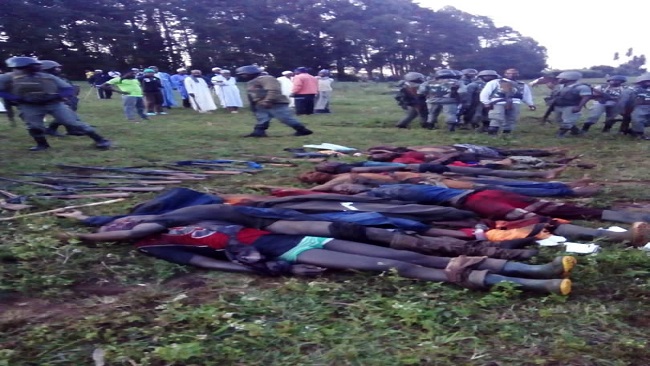End the bloodshed in Cameroon
The world has been paying little attention to the crisis in the English-speaking, or Anglophone, regions of Cameroon — which is perhaps less of a surprise considering that many local journalists have abandoned their profession in fear for their lives.
Last month, the Global Centre for the Responsibility to Protect released a publication underlining the gravity of the crisis and warning that “the risk of mass atrocity crimes occurring in the immediate future is very high.” While the military and armed separatist forces are both guilty of violence, the government has already perpetrated crimes against humanity, as documented in a report co-authored by our Cameroon-based Centre for Human Rights and Democracy in Africa and the Raoul Wallenberg Centre for Human Rights.
Cameroon’s army systematically torches entire villages to the ground, with more than 220 villages already wiped out. More than a half-million people have been forced from their homes, living without sufficient food, water or protection. More than 1.3 million people in the country’s English-speaking regions are in urgent need of humanitarian aid. In this precarious environment, sexual and gender-based violence is on the rise, often against girls below the age of 18, with doctors decrying the alarming increase in rape victims.
The violence has also prevented the children of Anglophone Cameroon from attending school for over three years. More than 4,400 schools have been forcibly closed, depriving upwards of 600,000 children of their education, pushing some to join armed groups, and putting the future of an entire generation at risk.
The roots of today’s crisis go back to 1961, when the British Southern Cameroons voted to join French Cameroun. The following decades saw an erosion in the Anglophone community’s autonomy and political, economic and cultural rights.
This culminated in late 2016, when English-speaking lawyers and educators peacefully demonstrated for basic rights. The government responded with a brutal crackdown and militarized the Anglophone regions. The crisis came to a head on Oct. 1, 2017, when tens of thousands marched peacefully for autonomy, chanting “no violence.” The government cracked down again, this time with unprecedented force, shooting indiscriminately at crowds, murdering people in their homes, arbitrarily arresting hundreds and subjecting detainees to torture. The violence quickly intensified, resulting in crimes against humanity and a rise in hate speech that could lead to further mass atrocity and even genocide.
In a rare speech last month, President Paul Biya, who is approaching his 38th year in power, announced the convening of a weeklong “national dialogue” that concludes today. Today’s announcement that he’s releasing 333 Anglophone detainees is a step in the right direction.
Yet his commitment to peace rings hollow so long as he denies the historical grievances of the Anglophone community and arbitrarily imprisons those who should be at the negotiating table, including Anglophone leaders. In August, the government sentenced 10 separatist leaders — including the head of the movement, Julius Sisiku Ayuk Tabe — to life in prison in a sham military trial. Other individuals suspected of ties to separatist groups have been detained and subjected to widespread torture. The violence has escalated since the separatist leaders were sentenced, claiming the lives of at least 40 individuals over the weekend following the verdict and scores of others in the days leading up to the national dialogue. Tens of thousands more have fled.
If the government fails to act as a good-faith partner to peace, international and regional organizations must step in. The crisis should be placed at the top of the agenda at the African Union, United Nations and European Union, as there are scarcely any geopolitical interests impeding coordinated international action. These organizations should focus on facilitating further dialogue, launching an independent investigation into the atrocities and increasing humanitarian aid — which, according to the United Nations’ humanitarian response plan, is 68 percent short of its goal this year — as we have already urged the U.N. Human Rights Council.
The U.N. Security Council could likewise refer the situation to the International Criminal Court for investigation, ending the culture of impunity that underpins mass atrocity.
A key recommendation produced by the national dialogue this week recognizes the “special status” of the Anglophone regions. If these words are to have any effect, the constitution must be amended to enshrine this principle. Biya should also pardon the 10 separatist leaders and grant a general amnesty to suspected separatists in detention or under investigation.
At present, however, the architects of the Cameroonian crisis have little incentive to make serious concessions. Government leaders live in the relative calm of the capital Yaounde, while the remaining separatist leaders are either imprisoned or abroad. Meanwhile, the children of Anglophone Cameroon continue to suffer unimaginable pain while the world stands idly by in the face of mass atrocity. All parties must come together for their sake, engage in an honest peace process and give hope to the next generation.
Source:Washington Post





